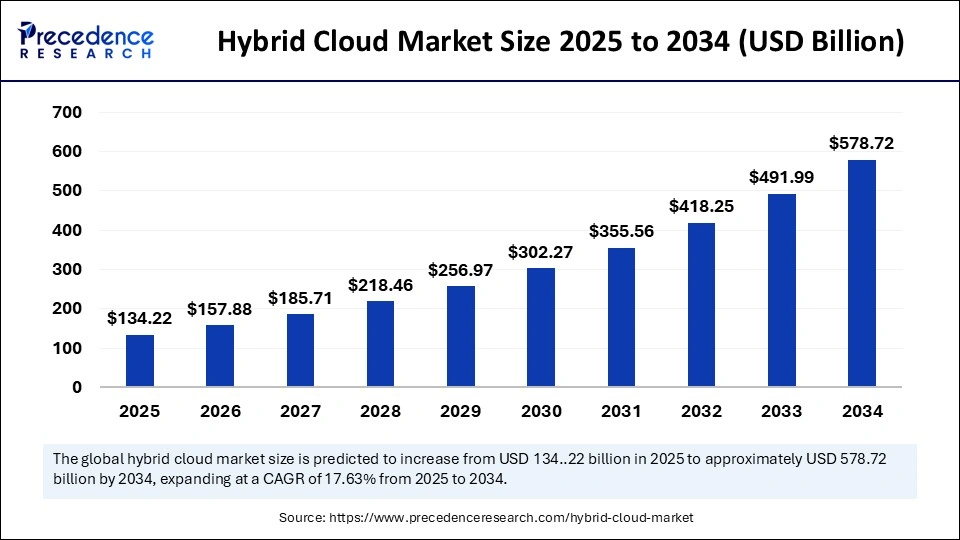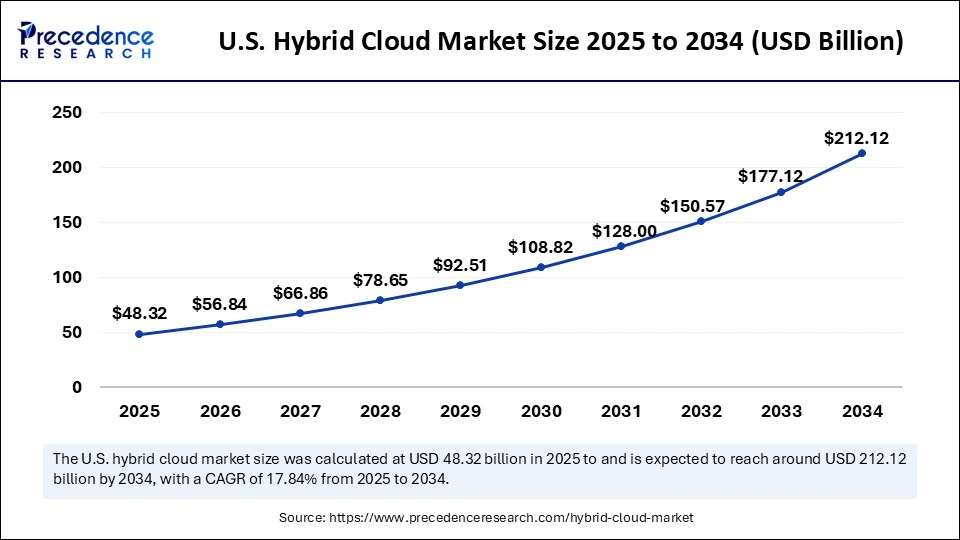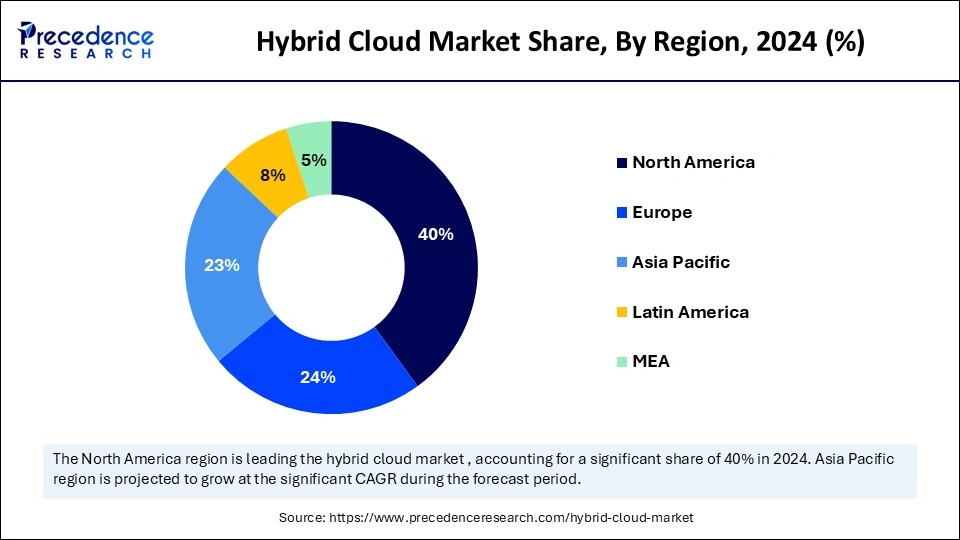What is Hybrid Cloud Market Size?
The global hybrid cloud market size accounted for USD 134.22 billion in 2025 and is predicted to increase from USD 157.88 billion in 2026 to approximately USD 578.72 billion by 2034, expanding at a CAGR of 17.63% from 2025 to 2034. The growth of the hybrid cloud market is attributed to the rising adoption of cloud-based solutions among worldwide businesses to improve operations and efficiency.

Market Highlights
- North America dominated the market with the largest share of 40% in 2024.
- By region, Asia Pacific is likely to witness the fastest growth during the forecast period.
- By component, the solution segment dominated the market in 2024.
- By component, the services segment is expected to grow at the fastest rate in the coming years.
- By service model, the software as a service (SaaS) segment led the hybrid cloud market in 2024.
- By service model, the platform as a service (PaaS) segment is projected to grow at a significant rate between 2025 and 2034.
- By enterprise, the large enterprises segment dominated the market in 2024.
- By enterprise, small and medium-sized enterprises segment is anticipated expand at the fastest rate in the upcoming period.
- By end-user, the BFSI segment led the market in 2024.
- By end-user, the IT & Telecom segment is projected to grow at the fastest rate between 2025 and 2034.
How is Innovation Impacting the Market?
Artificial Intelligence integration in the hybrid cloud significantly enhances security. AI-driven tools automate tasks like resource allocation and workload management in hybrid cloud environments. AI-based hybrid cloud solutions are particularly suited to enhance the scalability, security, and flexibility of IT organizations. AI-driven tools accelerate application deployment and development, enabling teams to bring products to market quickly while reducing human errors. An AI-driven approach is suitable for industries that prioritize control over data. Moreover, AI can detect anomalies in cloud environments, enhancing security and reducing the risk of data security.
Hybrid Cloud: Balancing Security, Flexibility, and Cost-efficiency in Healthcare and Business
A hybrid cloud combines both public and private cloud services, providing businesses with optimal solutions, scalability from public clouds, and security from private clouds. A hybrid cloud allows businesses to store sensitive data confidentially while utilizing cost-effective public cloud resources for non-sensitive workloads. The hybrid cloud plays a significant role, with the public cloud responsible for displaying live trade analysis, while private cloud trade orders are placed. It helps businesses save money, which is beneficial for SMEs. Hybrid cloud offers flexibility to easily manage resources from remote locations. The application of hybrid cloud computing is expanding in the medical sector, advancing the healthcare pipeline. Additionally, hybrid cloud provides a stable solution for healthcare stakeholders to easily access and manage data or servers.
Hybrid Cloud Market Growth Factors
- The rising digitization is a key factor boosting the growth of the hybrid cloud market. Hybrid cloud supports digital transformation by providing flexible and scalable IT infrastructure.
- The rising adoption of advanced technologies like artificial intelligence (AI), Internet ofThings, and edge computing is expected to boost the growth of the market during the forecast period. These technologies require high computing power and scalable infrastructure to perform, which can be provided by a hybrid cloud.
- The growing concerns about data security and privacy encourage businesses to shift toward cloud solutions, boosting the growth of the market.
Market Outlook
- Industry Growth Offerings- The hybrid cloud industry is growing due to rising demand for scalable, flexible, and cost-efficient IT solutions. Key offerings include cloud migration, multi-cloud management, AI-driven analytics, disaster recovery, and secure data storage across enterprises and industries.
- Global Expansion- Global expansion of the market is driven by increasing digital transformation, rising adoption of AI and IoT, demand for secure and flexible IT infrastructure, and investments by leading cloud providers to serve enterprises across North America, Europe, and Asia Pacific.
- Startup ecosystem- The hybrid cloud startup ecosystem is growing rapidly, with new companies offering innovative cloud management tools, AI-driven optimization, cybersecurity solutions, and industry-specific hybrid deployments. Startups focus on agility, cost-efficiency, and helping businesses transition smoothly to multi-cloud environments.
Market Scope
| Report Coverage | Details |
| Market Size in 2025 | USD 134.22 Billion |
| Market Size in 2026 | USD 157.88 Billion |
| Market Size by 2034 | USD 578.72 Billion |
| Market Growth Rate from 2025 to 2034 | CAGR of 17.63% |
| Dominating Region | North America |
| Fastest Growing Region | Asia Pacific |
| Base Year | 2024 |
| Forecast Period | 2025 to 2034 |
| Segments Covered | Component, Service Model, Enterprise Size, Industry Vertical and Regions |
| Regions Covered | North America, Europe, Asia-Pacific, Latin America, and Middle East & Africa |
Market Dynamics
Drivers
Rising Digital Transformation
The rising digital transformation is a major factor driving the growth of the hybrid cloud market. Businesses are rapidly embracing digital transformation initiatives, requiring robust IT infrastructure. Hybrid cloud provides ideal solutions by offering the benefits of both public clouds and on-premises, enabling businesses to adapt to changing needs. The growing adoption of digital tools helps businesses to streamline the workflow, cut operational expenses, and optimize labor utilization, therefore boosting productivity. In an era where customer expectations are rapidly evolving, businesses are now required to deliver seamless, consistent experiences across multiple digital channels. This increases the need for hybrid cloud solutions to support a scalable and flexible IT infrastructure, driving the growth of the market.
Restraint
Complexities in Management and Integration Challenges
As hybrid cloud environments are a blend of on-premises and public cloud, they require skilled personnel who have the knowledge of managing both technologies. However, a lack of skilled personnel limits the adoption of hybrid cloud solutions. Moreover, integrating on-premises infrastructure with the cloud creates complexities, requiring careful planning and robust infrastructure. This may discourage potential businesses from adopting hybrid cloud solutions, thus restraining the growth of the hybrid cloud market.
Opportunity
Growing Focus on Sustainable Business Practices
The growing focus on sustainable business practices creates immense opportunities in the market. Hybrid cloud solutions optimize resource allocation and support the implementation of green IT practices. Through strategies such as server consolidation, organizations can reduce energy consumption and lower their carbon emission, directly minimizing their overall environmental footprint. By shifting from traditional, on-premises infrastructure to cloud-based services, companies eliminate the need for extensive IT infrastructure, therefore reducing power usage and hardware waste. This transition not only delivers operational efficiency but also aligns with corporate environmental goals, creating a compelling value proposition for enterprises, which drives the growth of the market.
Segment Insights
Component Insights
The solution segment held the largest share of the hybrid cloud market in 2024. This is mainly due to the increased use of cloud solutions among businesses. Hybrid cloud solutions offer several advantages, such as agility, scalability, and greater flexibility. They provide businesses with the ability to have greater control over their data, ensuring security. Hybrid cloud solutions support businesses in digital transformation by providing scalable IT infrastructure.
The services segment is expected to grow at the fastest rate in the coming years. The growth of the segment is attributed to the increasing demand for managed services. Since integrating on-premises in cloud is a complex task, businesses often require professional and managed services to streamline integration of hybrid cloud solutions. These services permit businesses to reduce operational overhead, enhance performance, and focus on core competencies.
Service Model Insights
The software as a service (SaaS) segment held the largest share of the hybrid cloud market in 2024. SaaS offers many advantages, such as cost savings, since it resides in a shared or multi-tenant environment, where the hardware and software license expenses are low compared with the outdated model. SaaS models reside in cloud environments, which are scalable and can be easily integrated with other offerings. Compared with the traditional model, consumers are not required to buy other software or servers. SaaS solutions provide enhanced flexibility and scalability, enabling businesses to easily adapt to changing needs.
The platform as a service (PaaS) segment is projected to grow at a significant rate over the forecast period. Platform-as-a-Service (PaaS) is a cloud strategy that offers businesses a platform where they run, develop, and manage different applications quickly and efficiently. PaaS solutions enable businesses to adjust their application resources as per requirements, leading to cost savings.
Enterprise Insights
The large enterprises segment dominated the hybrid cloud market in 2024. Hybrid cloud solutions provide major advantages to large enterprises, such as high flexibility and scalability. Large enterprises often deal with vast amounts of data, requiring efficient solutions to prevent data theft. A hybrid cloud provides large enterprises with greater control over their data, enhancing security and privacy and reducing the risks of cyberattacks. Moreover, a hybrid cloud allows businesses to enhance resource allocation.
The small and medium-sized enterprises segment is anticipated to expand at the fastest rate in the upcoming period. Hybrid cloud offers SMEs an ideal solution to enhance operational performance by providing scalable IT infrastructure. The rapid shift of SMEs to digitization is expected to drive segmental growth. Hybrid cloud solutions provide SMEs with the flexibility to adapt to changing business needs.
End-user Insights
The BFSI segment dominated the hybrid cloud market with the largest share in 2024. This is mainly due to the increased need for IT infrastructure in the BFSI sectors. Hybrid cloud solutions provide BFSI institutes with scalable IT infrastructure, reducing the need to invest in IT infrastructure. Financial institutions generate huge amounts of sensitive data, which increases concerns regarding data security. Hybrid cloud solutions offer BFSI institutes an ideal way to ensure data security. Moreover, these solutions support banks to save huge money and lessen unnecessary expenses, thus increasing overall revenue. Also, the hybrid cloud helps financial institutions identify anomalies in their processes.
The IT & Telecom segment is projected to grow at the fastest rate over the forecast period. A hybrid cloud provides advantages to IT and telecom companies, such as greater control over data. These companies rely on data-driven services to enhance customer experience. Hybrid cloud solutions enable these companies to handle vast amounts of data and improve operational efficiency.
Segment Insights
U.S. Hybrid Cloud Market Size and Growth 2025 to 2034
The U.S. hybrid cloud market size is exhibited at USD 48.32 billion in 2025 and is projected to be worth around USD 212.12 billion by 2034, growing at a CAGR of 17.84% from 2025 to 2034.

North America Leads Hybrid Cloud Adoption Fueled by Tech Innovation and Major Providers
North America dominated the hybrid cloud market by holding the largest share in 2024 and is expected to sustain its position in the coming years. This is mainly due to its robust digital economy. The region is known for early adopter od advanced technologies, including cloud solutions. With the heightened adoption of advanced technologies like IoT and cloud computing, the demand for hybrid cloud has increased. The U.S. is a major market in North America for hybrid cloud. The country is home to leading cloud providers such as Amazon Web Services (AWS) and Microsoft Azure. These providers are making efforts to expand their operations throughout the region, supporting market growth.

What's Driving the Surge of Hybrid Cloud Adoption in APAC?
Asia Pacific is anticipated to witness the fastest growth during the forecast period. The growth of the market in the region can be attributed to the rising adoption of advanced technologies and digital services. By 2030, Southeast Asia's digital economy is expected to grow because of the fastest-growing base of digital applications and consumers. The rapid expansion of small and medium-sized enterprises (SMEs) plays a significant role in boosting the APAC market.
China and India are expected to have a stronghold on the hybrid cloud market in Asia Pacific. There is a rising adoption of artificial intelligence (AI) and other technologies among Chinese businesses. Strong economic growth and digitalization boost the demand for hybrid cloud solutions. India is emerging as a tech-savvy nation. Businesses in the country are rapidly shifting their operations to cloud environments. The rapid expansion of the IT and BFSI sectors further supports market growth. In addition, the rising government's initiatives to promote the adoption of cloud technologies contribute to market growth.
For instance, the Indian Government's Meghraj, a cloud computing initiative, plays a significant role in fostering hybrid cloud adoption. This initiative focuses on accelerating the delivery of e-services in the country while optimizing the ICT spending of the Government.
Why the U.S. Leading the Hybrid Cloud Market?
The U.S. market is growing due to the country's advanced digital economy and early adoption of cloud technologies. Increasing demand for scalable, flexible, and cost-effective IT infrastructure drives adoption among enterprises. Major cloud providers like Amazon Web Services (AWS) and Microsoft Azure are expanding their services, supporting businesses in data management, analytics, and secure operations. Growth in AI, IoT, and digital services further fuels market expansion.
What's Driving the Rapid Growth of Hybrid Cloud in China?
The China market is expanding as enterprises seek improved data integration, collaboration, and business continuity solutions. Rising investments in smart cities, e-commerce, and industrial automation are driving cloud adoption. Companies are leveraging hybrid cloud to enhance IT agility, streamline operations, and meet growing regulatory and cybersecurity requirements, while the country's focus on digital transformation supports long-term market growth.
Why is Hybrid Cloud Expanding Across Europe?
The Europe market is expanding due to increasing demand for flexible, secure, and cost-efficient IT infrastructure across enterprises. Strict data privacy regulations, such as GDPR, are encouraging organizations to adopt hybrid solutions to manage sensitive data locally while leveraging public cloud scalability. Additionally, growing digital transformation initiatives, adoption of AI and IoT technologies, and investments in cloud services by key industries like finance, healthcare, and manufacturing are driving market growth.
How is the Uk Adopting Hybrid Cloud for Business Transformation?
The UK market is growing due to the increasing need for efficient multi-cloud management and seamless integration of legacy systems with modern IT infrastructure. Organizations are leveraging hybrid cloud to improve operational agility, enhance disaster recovery, and support remote work. Additionally, government digital initiatives, rising adoption of advanced analytics, and demand for scalable computing resources in sectors like manufacturing and education are driving market expansion.
Key Players in Hybrid Cloud Market and their Offerings
- SAP SE: Provides hybrid cloud solutions, ERP, data management, and analytics platforms to help enterprises integrate operations, improve efficiency, and enable digital transformation across industries.
- Atos SE: Offers managed hybrid cloud services, cybersecurity, and IT consulting, focusing on digital transformation, cloud migration, and secure enterprise infrastructure.
- IBM Corporation: Delivers hybrid cloud platforms, AI-driven analytics, and enterprise cloud solutions, enabling secure, scalable, and integrated IT operations across industries.
- Oracle Corporation: Provides hybrid cloud infrastructure, database, and enterprise applications, supporting cloud migration, data management, and business process automation.
- Teradata: Specializes in hybrid cloud data analytics, data warehousing, and business intelligence solutions, helping organizations optimize insights and decision-making across multi-cloud environments.
Recent Developments in the Market
- In March 2025, Sangfor Technologies announced a strategic partnership with CITIC Telecom International CPC Limited, a wholly-owned subsidiary of CITIC Telecom International Holdings Limited. This partnership integrates Sangfor's advanced technologies with CITIC Telecom CPC's innovative ICT capabilities to jointly develop innovative, compliant, and trusted hybrid cloud services.
- In April 2024, Cadence Announced the Most Comprehensive True Hybrid Cloud Solution to Provide Seamless Data Access and Management. This solution provides customers with the flexibility and simplicity they need to leverage a single data source and move between cloud, on-premises, or hybrid multi-cloud environments without any intervention from IT teams managing those clusters.
- In January 2024, Hitachi Vantara, the data storage, infrastructure, and hybrid cloud management subsidiary of Hitachi, Ltd., announced the next evolution of its partnership with Cisco, introducing an innovative suite of hybrid cloud services designed to address ongoing data management challenges faced by modern enterprises.
- In December 2023, Lenovo announced the expansion of its hybrid cloud platform for AI with new ThinkAgile hyperconverged solutions and ThinkSystem servers that advance cloud deployment, hybrid connectivity, and AI capabilities, powered by the next generation of Intel Xeon Scalable Processors.
Segments Covered in the Report
By Component
- Solution
- Services
By Service Model
- Software as a Service (SaaS)
- Infrastructure as a Service (IaaS)
- Platform as a Service (PaaS)
By Enterprise Size
- Large Enterprises
- Small and Medium-sized Enterprises
By Industry Vertical
- IT & Telecom
- Healthcare
- BFSI
- Retail
- Government
- Media and Entertainment
- Transportation and Logistics
- Manufacturing
- Others
By Region
- North America
- Europe
- Asia Pacific
- Middle East & Africa
- Latin America
For inquiries regarding discounts, bulk purchases, or customization requests, please contact us at sales@precedenceresearch.com
Frequently Asked Questions
Tags
Ask For Sample
No cookie-cutter, only authentic analysis – take the 1st step to become a Precedence Research client
 Get a Sample
Get a Sample
 Table Of Content
Table Of Content




 sales@precedenceresearch.com
sales@precedenceresearch.com
 +1 804-441-9344
+1 804-441-9344
 Schedule a Meeting
Schedule a Meeting